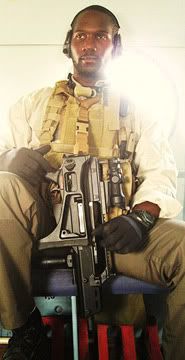Could we have a situation where violence gets so bad in Mexico, that we will actually see war refugees gathering at the border? Imagine thousands of people, all trying to get on the US side of the border, all because things have gotten so bad in Mexico that the people no longer trust that their government can protect them. Things are already bad enough economically there, that people are willing to risk illegal immigration to cross into the US. If you add the fear of violence caused by the drug war to the mix, well then now you can see how this is something we need to look at.
At this point, we are just seeing the political asylum cases increase. The next stage if things got really bad, is just camping out at the border. If cartels are taking over entire towns, and the Mexican military is having to retake those towns, then you could see why people wouldn’t want to live there.
And to follow this train of thought, where would we put them all? Well, if things got that bad, I am afraid that my tent city idea that I brought up for illegal immigrants, would more than likely turn into refugee camps. When you start thinking about the problems in Mexico in this way, it really puts into perspective as to what the potential is and why we should care. I also think that looking at other drug wars like in Colombia are particularly helpful, just to get an idea of where it is all going.
Finally, check out the last story I posted. It is about a coordinated attack on Mexican army bases, by cartel henchmen. That is a new chapter in this drug war, and I am sure we will see more of this.-Matt
——————————————————————
Will we see this in the U.S., in order to deal with a humanitarian crisis caused by the drug war in Mexico?
Worse Than Colombia
by Brandi GrissomMarch 31, 2010
The violence raging in Mexico’s drug war is worse now than the terror that enveloped Colombia during the 1980s and 1990s ever was, Texas Department of Public Safety Director Steve McCraw told state lawmakers Tuesday.
“Colombia was never threatened like the government of Mexico is with the level of violence,” McCraw told the House Select Committee on Emergency Preparedness at a Capitol hearing.
The committee and its chairman, state Rep. Aaron Peña, D-Edinburg, focused many of their questions about the state’s emergency preparedness on the current violence just across the border in northern Mexico, particularly in Juárez. “Each and every day we hear about killings, shootings, assassinations, kidnappings,” said Peña, whose hometown is about 10 miles from the Mexican city of Reynosa. While McCraw said the violence will get worse before it gets better and has already outpaced the scariness of Pablo Escobar’s Medellín cartel in Colombia, at least one border expert disagreed, saying that the United States would never let the situation in its neighboring country devolve into the lawlessness that plagued Colombia. “I think maybe he’s exaggerating,” said University of Texas at El Paso professor Howard Campbell.
Peña asked McCraw to compare the violence in Mexico to that during the drug war in Colombia. McCraw said the situation in Mexico is worse. The United States eventually intervened to help the Colombian government quell the violence and take down Pablo Escobar in 1993. “That hasn’t happened in Mexico,” McCraw said. Though Mexican President Felipe Calderón is trying to control the violence, McCraw said those efforts so far have not worked. “There has never been a more significant threat as it relates to cartels and drug and human smuggling on the border today,” he said. Juarez alone has seen more than 4,800 drug war deaths since 2008, according to recent reports in the El Paso Times, including at least 600 killings this year.
(more…)
